The martyrdom of Mike Pence
As vice-president, he abased himself and his office. In reward, Donald Trump sent a mob to kill him. Now, as another impeachment trial looms, he is cast out from Republican ranks
Sun 7 Feb 2021 06.00 GMT
A
Nobody was more responsible for fostering the cult of Trump. The evangelical Pence had been Trump’s rescuer, starting with his forgiveness for the miscreant in the crisis during the 2016 campaign over Trump’s Access Hollywood “grab them by the pussy” tape and then over the disclosure of the “Individual One” hush money payoff to a porn star about a one-night stand to shut her up before election day – AKA “the latest baseless allegations”. Pence was the indispensable retainer who delivered the evangelical base, transforming it through the alchemy of his faith into Trump’s rock of ages. After every malignant episode, from Charlottesville (“I stand with the president”) to coronavirus (“The president took another historic step”), the pious Pence could be counted on to bless Trump for his purity of heart and to shepherd the flock of true believers.
“Trump’s got the populist nationalists,” Stephen Bannon, Trump’s pardoned former senior adviser, remarked. “But Pence is the base. Without Pence, you don’t win.”
Withstanding the howling winds of narcissism, the unshakably self-abasing Pence upheld the cross over Trump. On the evening of 3 May 2017, Trump welcomed his evangelical advisory board for dinner in the Blue Room of the White House.
“I’ve been with [Trump] alone in the room when the decisions are made,” Pence testified to the assembled pastors. “He and I have prayed together. This is somebody who shares our views, shares our values, shares our beliefs.”
Nobody more than Pence had modeled adulation of Trump to become the standard for sycophantic imitation. At the first meeting of members of Trump’s cabinet, on 12 June 2017, the president called on each to offer praise.
“I’m going to start with our vice-president. Where is our vice-president?” Trump asked. “We’ll start with Mike and then we’ll just go around, your name, your position.”
“This is just the greatest privilege of my life,” Pence said, setting the tone for the others.
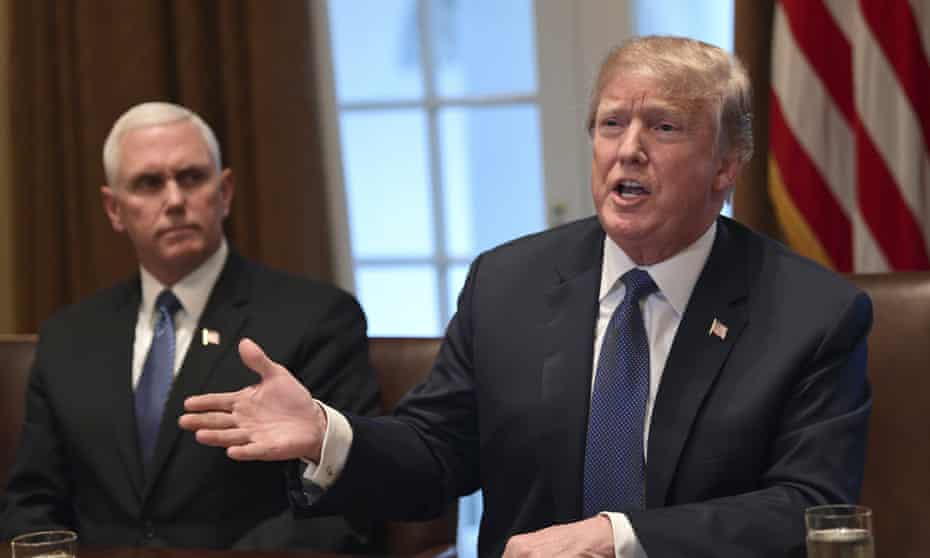
By August, Pence had mentioned Trump’s “broad shoulders” 17 times, to proclaim his manly strength. At the cabinet meeting of 20 December 2017, Pence praised Trump 14 times in just under three minutes, a commendation every 12.5 seconds, concluding in his last breathless, fawning words: “And we are making America great again.” On 6 June 2018, at a meeting of the Federal Emergency Management Agency, Trump suddenly and inexplicably put his water bottle on the floor. Without missing a beat, Pence, seated beside him, put his bottle on the floor too.
Finally, after 61 failed lawsuits challenging the presidential election, Trump’s lawyers Rudy Giuliani and Jenna Ellis told him there was a magic solution. Pence, presiding over the counting of the ballots of the electoral college before a joint session of Congress on 6 January, could overturn results in the key states that had gone against Trump, by deciding himself which votes to certify and which to reject. Rightwing social media was awash with rumors about “the Pence card”.
Pence sought the opinions of an array of conservative legal experts, who uniformly stated that he had no such authority. For days, Trump badgered him. On 4 January, campaigning in Georgia for Republican senatorial candidates, Trump said: “If the liberal Democrats take the Senate and the White House, and they’re not going to take the White House, we’re going to fight like hell, I hope Mike Pence comes through for us, I have to tell you … He’s a great guy. Of course, if he doesn’t come through I won’t like him quite as much … He’s a wonderful man, a smart man and a man I like a lot.”
On the day before the electoral college votes were to be certified, 5 January, Trump tweeted, “The Vice-President has the power to reject fraudulently chosen electors.” Hours later, Trump cornered Pence in the Oval Office. He had brought along a rightwing law professor, John Eastman, from Chapman University, who argued that Pence had the power to overturn the electoral college. Eastman had written an op-ed asserting that Kamala Harris was ineligible to run for vice-president because she was not a proper US citizen – a new birtherism. Trump told Pence Eastman was “very highly qualified”. For once, Pence stood his ground. His reverence turned into recalcitrance. He rebuffed Trump. There was a line he would not cross.
That night, after the New York Times reported that Pence felt “he would need to balance the president’s misguided beliefs about government with his own years of preaching deference to the constitution”, Trump issued a statement: “The New York Times report regarding comments Vice-President Pence supposedly made to me today is fake news. He never said that. The Vice-President and I are in total agreement that the Vice-President has the power to act.”
Before dawn on 6 January, after it was clear the Republicans had lost both seats in Georgia and with them control of the Senate, Trump frantically engaged in a tweet storm.
“States want to correct their votes, which they now know were based on irregularities and fraud, plus corrupt process never received legislative approval. All Mike Pence has to do is send them back to the States, AND WE WIN. Do it Mike, this is a time for extreme courage!”
Then Trump called Pence at the vice-presidential residence, the Naval Observatory, to deliver an ultimatum. “You can either go down in history as a patriot, or you can go down in history as a pussy,” Trump said. But Pence spurned him again. He hung up and got into his motorcade. As he drove to the Capitol, Trump mounted the platform at his “Stop the Steal” rally outside the White House, to address thousands of followers.
Trump knew Pence intended to perform his constitutionally prescribed duty to preside over the process that would seal Joe Biden’s election. Pence had repeatedly told Trump that was what he would do. Trump had tried every means to dislodge him from his position, but Pence proved immovable. Trump’s call that morning, threatening him as a “pussy”, was the last desperate gambit. Trump knew the string was played out.
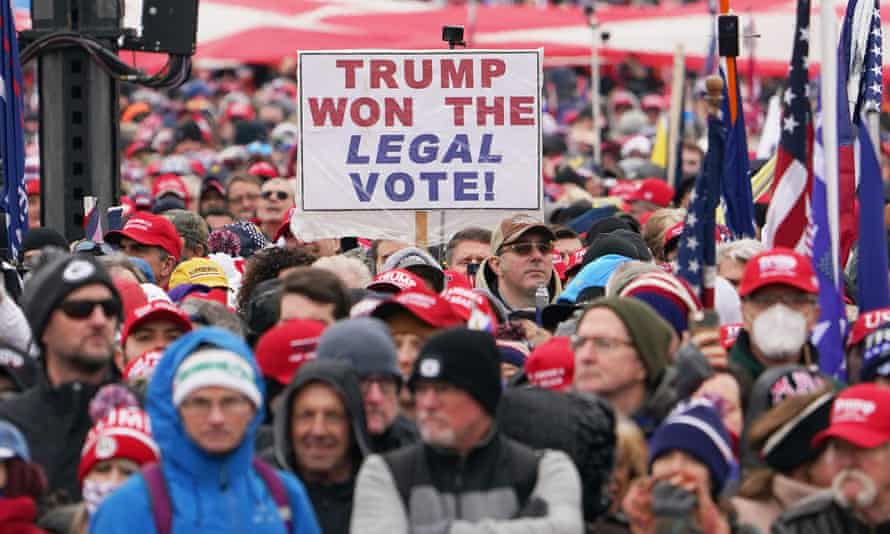
But when he addressed the crowd he had assembled, Trump pretended he did not know what Pence was going to do. Stung by Pence’s emphatic refusal, he knew he was retailing a false narrative. He feigned that Pence had not yet made up his mind – and that the entire decision now depended upon him. Trump built up the dramatic suspense, stoked the crowd’s anger and directed its fixation. Trump turned the entire crisis on to Pence.
Trump referred to Pence 13 times in his speech:
I hope Mike is going to do the right thing. I hope so. I hope so. Because if Mike Pence does the right thing, we win the election … All Vice-President Pence has to do is send it back to the states to re-certify and we become president and you are the happiest people. And I actually, I just spoke to Mike. I said: ‘Mike, that doesn’t take courage. What takes courage is to do nothing. That takes courage’ … And Mike Pence is going to have to come through for us, and if he doesn’t, that will be a sad day for our country because you’re sworn to uphold our constitution … And Mike Pence, I hope you’re going to stand up for the good of our constitution and for the good of our country. And if you’re not, I’m going to be very disappointed in you. I will tell you right now. I’m not hearing good stories … They want to re-certify. But the only way that can happen is if Mike Pence agrees to send it back. Mike Pence has to agree to send it back. So I hope Mike has the courage to do what he has to do. And I hope he doesn’t listen to the Rinos [Republicans In Name Only] and the stupid people that he’s listening to …
Targeting Pence, Trump urged his followers forward. “And we fight. We fight like hell. And if you don’t fight like hell, you’re not going to have a country any more … So let’s walk down Pennsylvania Avenue”– to the Capitol.
Trump was well aware that the crowd contained violent elements. He knew it was not like one of the festive crowds that attended his campaign rallies, warmed up with singing and dancing. In his 1 October debate with Biden, Trump had given a shoutout to the white supremacist Proud Boys, calling out their name and giving them a slogan: “Stand back and stand by.” On 12 December, Proud Boys led thousands of paramilitary demonstrators to protest against the election result in Washington.
“WE HAVE JUST BEGUN TO FIGHT!!!” Trump tweeted that morning to greet them. That night, the Proud Boys roamed the streets, provoking fights. Four people were stabbed, one shot, a police officer assaulted and 33 people arrested. The Proud Boys’ leader, Enrique Tarrio, was later arrested for burning a “Black Lives Matter” banner at a historic Black church and charged with two counts of felony for illegal possession of high-capacity guns.
“We won the Presidential Election, by a lot. FIGHT FOR IT. Don’t let them take it away!” Trump tweeted on 18 December. The next day he tweeted: “Big protest on 6 January. Be there, will be wild!”
Arriving at the Capitol that day, taking his place in the Senate chamber at 1pm, Pence issued a statement: “It is my considered judgment that my oath to support and defend the constitution constrains me from claiming unilateral authority to determine which electoral votes should be counted and which should not.”
Trump was just finishing speaking. The spearhead of the mob had already broken through the police perimeter on the west side of the Capitol. Just after 2pm, led by the Proud Boys and other paramilitary groups, the mob poured through smashed windows and doors and rushed into the corridors, chanting: “Hang Mike Pence!”
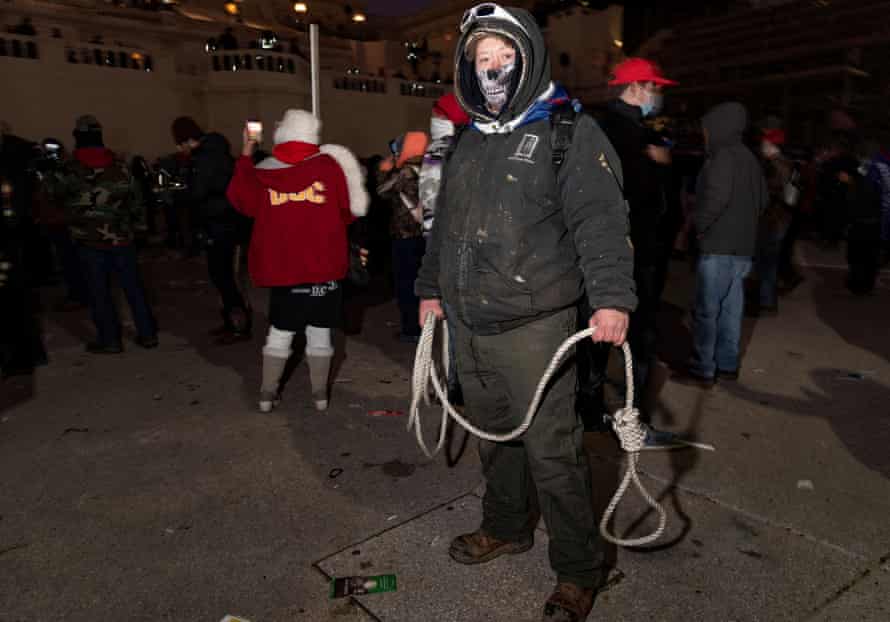
“Once we found out Pence turned on us and that they had stolen the election, like, officially, the crowd went crazy. I mean, it became a mob,” said one rioter, later arrested, in a video posted on YouTube. Another of those arrested texted: “When we found out Pence fucked us, we all stormed the Capitol building and everyone forced entry and started breaking shit. It was a like a scene out of a movie.”
But many of those assaulting the Capitol had already received Trump’s tinfoil cue to focus on Pence. The FBI charging paper for one arrested rioter, an alleged QAnon militant, quoted a text message two weeks before the attack: “I’m there for the greatest celebration of all time after Pence leads the Senate flip!! OR IM THERE IF TRUMP TELLS US TO STORM THE FUKIN CAPITAL IMA DO THAT THEN! We don’t want any trouble but they are not going to steal this election that I guarantee bro!!”
Secret service agents hustled Pence out of the chamber. “Where’s Mike Pence?” chanted the mob, racing to locate him. They carried a noose, marked with his name. Pence was in an office only about 100ft away. A quick-thinking Capitol police officer steered the rampaging throng to chase him in the opposite direction. At 2.24pm, amid the mayhem, Trump tweeted: “Mike Pence didn’t have the courage to do what should have been done to protect our country and our constitution, giving states a chance to certify a corrected set of facts, not the fraudulent or inaccurate ones which they were asked to previously certify. USA demands the truth!”
Dozens of messages immediately appeared on Gab, a social media networking site favored by neo-Nazis and white supremacists, encouraging those inside the Capitol to capture Pence.
“I heard at least three different rioters at the Capitol say that they hoped to find Vice-President Mike Pence and execute him by hanging him from a Capitol Hill tree as a traitor,” reported Jim Bourg, the Reuters picture editor in Washington. “It was a common line being repeated. Many more were just talking about how the VP should be executed.”
At 3.55pm, Pence tweeted: “The violence and destruction taking place at the US Capitol Must Stop and it Must Stop Now.” Nearly five hours later, the Capitol had been cleared, the Senate reconvened and Pence stood at the dais. On the desk, a note had been left for him by the shirtless, horned fur-hatted, face-painted, self-proclaimed “QAnon shaman”, one Jacob Chansley.
“It’s only a matter of time, justice is coming,” it read.
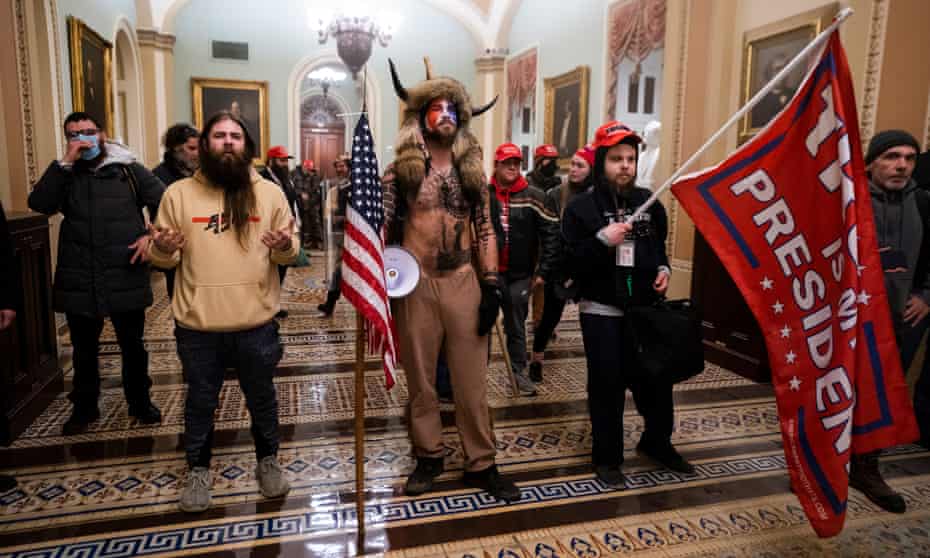
At 3.34am, in the early hours of 7 January, Pence affirmed that Joe Biden had won the election. Five people, including a Capitol police officer, would die as a result of the riot; 140 police were injured.
Throughout the pandemonium in the Capitol, Trump did not seek to discover whether Pence was safe. He did not call him. He was watching the insurrection on TV at the White House, “excited” and “delighted”, according to the Republican senator Ben Sasse, who told of accounts heard from aides who were with the president. Trump never did call Pence.
“I’ve known Mike Pence for ever,” said a friend, Senator James Inhofe of Oklahoma. “I’ve never seen Pence as angry … He said, ‘After all the things I’ve done for [Trump].’”
On 8 January, Trump announced he would not attend the inauguration. Pence stated that he would be there, to see Biden take the oath of office.
On the mantle above the fireplace in his library at the vice-president’s residence, Pence placed a framed passage from the Bible’s Book of Jeremiah.
“‘For I know the plans I have for you,’ declares the Lord, ‘Plans to prosper you and not to harm you, plans to give you hope and a future.’”
For Pence, the quotation from scripture was a complacent blessing from the gospel of prosperity. (He conveniently did not frame other passages from Jeremiah preceding and following his favorite citation: “Do not let the prophets and diviners among you deceive you. Do not listen to the dreams you encourage them to have. They are prophesying lies to you in my name. I have not sent them,” declares the Lord … “You should put any maniac who acts like a prophet into the stocks and neck-irons.”)
Pence did not know God’s plan for him. He was just certain that God had one in mind. Pence did not voice the prophesy. He was no prophet. He was not the oracle. But he knew that he had a divinely ordained destiny. He believed it would unfold with his heavenly ascent to the highest position, becoming president as reward for his faithful humility. He adhered to the evangelical notion of “servant leadership”, Marc Short, his chief of staff and a fellow evangelical, explained to the Atlantic. Pence modeled himself on Jesus washing his disciples’ feet, a model for evangelicals to follow in his example toward Trump: “Whoever wants to become great among you must be your servant, and whoever wants to be first must be your slave.”
“Servant leadership is biblical,” Short said. “That’s at the heart of it for Mike, and it comes across in his relationship with the president.”
The political marriage of Pence and Trump was an alliance of opposites, a calibrated balancing act of the pious and the pitiless, the sacred and the profane, the bland Hoosier and the brash New Yorker, the lockstep partisan and the egotist. It was also a team of media celebrities, minor and major, the trusted voice from the heartland leading his true believers to the TV reality show confidence man.
Pence had risen to prominence as a conservative talkshow host in Indiana, “His Mikeness”, self-described as “Rush Limbaugh on decaf”, opening every show: “Greetings across the amber waves of grain.” When local Republicans urged him to run for Congress, his intimate adviser, his wife, Karen, whom he calls “Mother”, interpreted two hawks flying overhead as God’s sign. Pence served six undistinguished terms, ingratiated himself with the Koch brothers’ donor network as its servant, and the party elevated him to the Indiana governor’s chair. His principal accomplishment was to enact a bill discriminating against gay people, the Religious Freedom Restoration Act, which under widespread criticism and threats of boycott he essentially rescinded. He was uncertain of re-election; then Trump plucked him from obscurity. Another sign.
The relationship was set in stone at the beginning. The Access Hollywood tape was the formative event. Everything followed from Trump’s risky business and Pence’s avid devotion. When the scandal broke, the Republican National Committee chairman, Reince Priebus, organized pressure on Trump to quit and Pence to assume his place, according to Pence’s biographer Tom LoBianco.
“Donald Trump should withdraw and Mike Pence should be our nominee effective immediately,” tweeted Senator John Thune, of South Dakota. Karen Pence was “livid”. But Pence refused to drink from the chalice he was offered, believing it to be poisoned. If he replaced Trump, he would be blamed for destroying him and the inevitable election defeat. Instead, he believed Trump would lose and he, Pence, would be ideally positioned to be the Republican nominee in 2020, to take on President Hillary Clinton. And when Trump survived and went on to win, Pence was the next in line.
Pence was not blind about Trump. Karen Pence confided to one of his aides: “We knew we were signing up for something unique. We knew there would be times he’d say and do things we’d never do. We understood that … Obviously, it’s disappointing, but it doesn’t change the mission.”
Trump was Pence’s cross to bear. Whether Pence respected him was beside the point. Trump only wanted to be worshipped. He obviously thought he had endless use of the simplistic Pence as his tool. But Pence knew that both he and Trump were tools of the Lord, though for different purposes. He wanted to create a worshipful presence for Trump, toward greater ends about which Trump was completely unknowing. Pence had been put into his position for the Lord’s purposes, in an unfolding divine story. He was right with the Lord. He was not only elected; he was among the elect. The Lord blessed his servant. The blessing was a promise of his ever-rising advancement so long as he was steadfast. He stayed the course no matter the tribulations and privations. His destiny had been written. He proved himself worthy by his steadfastness in bearing the desecrations of the unworthy Trump. Every further revelation of Trump’s character confirmed that Pence was being tested for the time beyond Trump. Pence carried his cross for a glorious consummation for the most faithful of the Lord’s chosen, Mike Pence.
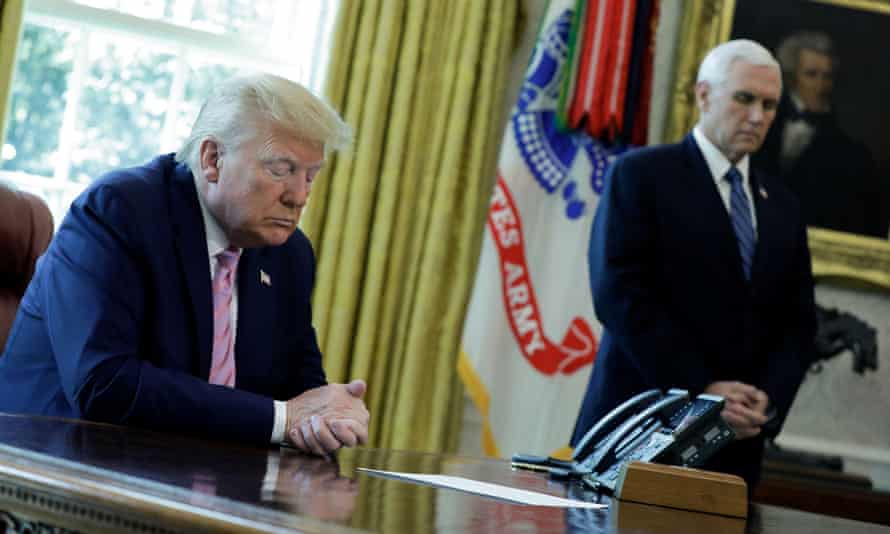
If Pence maintained his equanimity, he could keep moving forward. His voice was steady, his manner was steady and when a fly landed on his head in his debate with Kamala Harris, he was steady. He had practice with far greater distractions. This fly didn’t do anything embarrassing, except land on his head. It was not the fly’s fault. Pence could bear everything.
But the more Pence succeeded in achieving his perfection of humility and show of gratitude, the more he persuaded the evangelicals it was Trump who was divinely anointed. Regardless of how Pence saw himself in his inner vision, through his ministrations the evangelicals came to see Trump as the one who made America right with the Lord. Pence made sure the credit went to his lord. He rendered unto Caesar.
Pence did not know that staying the course would be his undoing. His role as president of the Senate in presiding over the counting of the electoral college votes was largely ceremonial and passive. Pence believed he was true to the constitution –under God. He had taken his oath on his Bible. His presence naturally lent the process legitimacy. For Trump, that was the problem. Pence’s faith created a schism not only with Trump, but also with his ambition.
Trump by his lights had not lost the election; it was stolen. Trump could never be a loser. He had won. He was being deprived of his victory. Pence alone could change it. If he did not, he explained Trump’s failure. The fault was displaced on to Pence.
Pence bestowed on Trump the fatal kiss. Pence was the Judas. He did not ever imagine he was Judas, but always God’s servant. Judas knew he was betraying Jesus, but Pence never thought he was betraying Trump. Pence never knew that all along, this was part of God’s plan.
Upholding his oath, Pence’s hopes turned to ashes. He became something he never anticipated: the fall guy. He never expected he would be Trump’s patsy. It was one thing to be his flunky, but Pence never thought, even after all the other adults in the room had departed in obloquy, he’d be the last patsy standing.
Pence may consider himself one of the most unselfish Christians. The extreme case of humility is when a person gives his all to someone who is completely selfish and has no other purpose. Now loathed by evangelicals, Pence must console himself with the holy paradox invested in martyrs, in which the martyr scorned by his own people suffers for the greater good of the Lord. Only later is the martyr beatified as a saint. Becoming such a martyr might get Pence a stained-glass window in some future crystal cathedral, but it will not get him anywhere in the Republican party.
Pence is reportedly isolated, in a borrowed cabin in Indiana, having arranged to be a “visiting fellow” at the Heritage Foundation.
No evangelical leader has stepped forward to defend his honor. No Republican leader has vouched for his virtue, obligations and higher loyalty. Abandoned and alone, the object of hatred, the target of threats. Pence had taught his flock to worship its lord and cast out heretics. He delivered everything to Trump, and Trump delivered Pence to the mob as a scapegoat. Pence had shown them the way to follow Trump as a true servant. And they did.
“Hang Mike Pence!”
Sidney Blumenthal, former senior adviser to President Bill Clinton and Hillary Clinton, has published three books of a projected five-volume political life of Abraham Lincoln: A Self-Made Man, Wrestling With His Angel and All the Powers of Earth


Geen opmerkingen:
Een reactie posten
Opmerking: Alleen leden van deze blog kunnen een reactie posten.